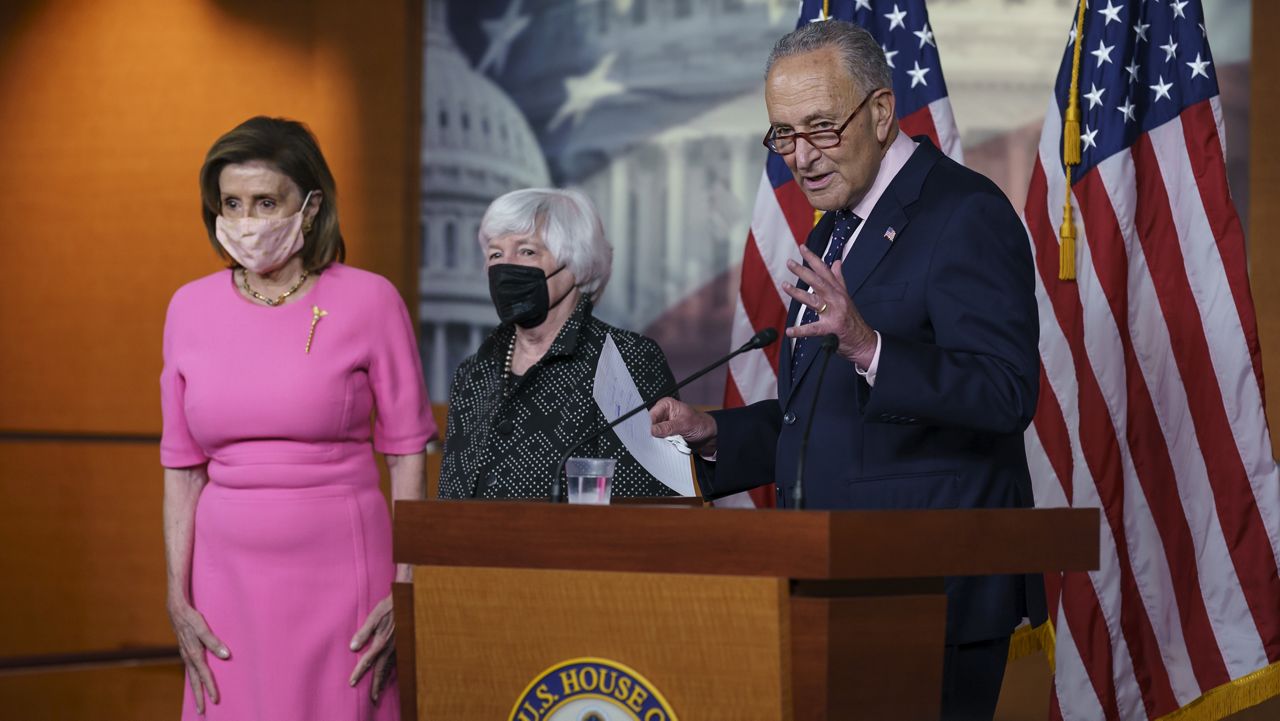Senate Majority Leader Chuck Schumer, D-N.Y., announced Thursday that the White House and Congressional Democrats reached an agreement on how to fund their multi-trillion dollar budget reconciliation measure, but did not provide details.
The announcement came just one day after a series of meetings between key House and Senate Democrats and the White House to try and hash out a clear path forward on two key parts of President Joe Biden’s agenda — the budget measure and the $1 trillion bipartisan infrastructure bill.
"The White House, the House and the Senate have reached agreement on a framework that will pay for any final negotiated agreement,” Schumer said at House Speaker Nancy Pelosi’s press conference Thursday. “So the revenue side of this, we have an agreement on.”
“We know we can cover the proposal the president has put forth,” Pelosi, D-Calif., said, adding: “I’m very excited about this. It’s all good.”
Schumer provided few details, but later told reporters that the framework is “a menu of options, and it will pay for whatever the agreement on the investments comes to.”
The timing of the announcement comes amid key deadlines for both bills — and an ideological divide between moderates on progressives on which bill to prioritize.
Moderates have urged Congress to pass the $1 trillion bipartisan infrastructure bill — which has already passed the Senate and would provide funding for roads, bridges and other public works projects — threatening to withhold support for the larger budget measure. But progressives have pledged the same if Congress considers the infrastructure bill before the budget reconciliation measure, which contains funding for key social safety net programs, including paid family leave and free education proposals.
President Biden and Democratic leaders have aimed for a $3.5 trillion investment over 10 years for the reconciliation bill. Moderates have urged for a lower price tag on the bill, but progressives, some of whom called for more spending, have highlighted the urgency for that level of spending.
“I am confident that we will pass both bills," Pelosi told reporters, without providing details on timing. "What we said was the House, the Senate and the White House came to an agreement on how we can go forward in a way to pay for this."
The social and environment bill incorporates much of Biden’s domestic agenda. It includes a sweeping overhaul of federal taxes and spending to make what the president views as overdue investments in health care, family services and efforts to fight climate change.
The measure would impose tax hikes on corporations and wealthy Americans earning beyond $400,000 a year and plow that money back into federal programs for young and old, along with investments to tackle climate change.
“I’m a pay-go person. Pay as you go," Pelosi said, when asked for more details about the framework. “This is not about price tag, this is about what's in the bill. What's in the bill? For children, what's in the bill? Universal pre-K, childcare, Child Tax Credit, family — medical leave for their families, protecting the planet for them. It’s about specific legislation. How much does that cost? How do we pay for it?”
Despite disputes, many Democrats say they expect the final product to align with Biden’s broader vision and eventually have robust party support, even if that version is adjusted or scaled back.
“I’ve always been very calm about this,” Pelosi said. “It always happens the same way … but at the end of the day, we will be unified for the American people.”
White House press secretary Jen Psaki said of the framework that "we certainly think it's progress.
"It builds on the president's meetings he had yesterday with leadership with moderates with progressives, to talk about the path forward" in an effort to unify Democrats around the president's domestic agenda, she continued.
"It’s a menu of revenue raisers," she said, echoing what Leader Schumer said earlier and referring further questions to the majority leader's spokesperson.
Pelosi and Schumer were joined by Treasury Secretary Janet Yellen, who has continually urged lawmakers to take action to address the debt ceiling to make sure that the U.S. does not default on its debt obligations, warning of catastrophic consequences for the global economy.
“We will keep the government open by September 30,” Pelosi said, “and continue the conversation about the debt ceiling.”
The House passed a bill earlier this week that would suspend the debt limit until next year, while also continuing to fund the government through December, as well as provide $28.6 billion in emergency funding for those impacted by recent natural disasters and $6.3 billion to support Afghan refugees. But Republicans have signaled that they will not support the bill, putting Democrats in a situation where they may be forced to go it alone to keep the government funded and avoid defaulting.
“We will have a continuing resolution that passes both houses by September 30th,” she added.
Spectrum News' Austin Landis and The Associated Press contributed to this report.



